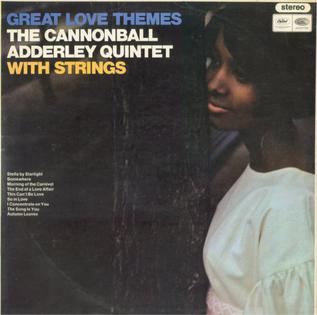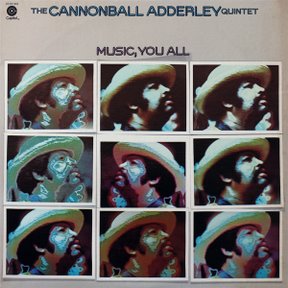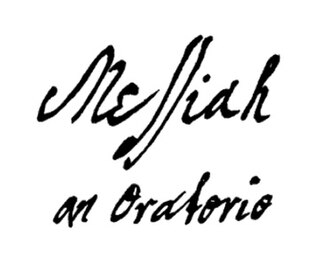
Julian Edwin "Cannonball" Adderley was an American jazz alto saxophonist of the hard bop era of the 1950s and 1960s.

David Axelrod was an American composer, arranger, and producer. After starting out as a staff producer for record companies specializing in jazz, Axelrod became known by the mid-1960s in soul and jazz circles for his recording skills. In 1968, Axelrod embarked on a solo career and released several albums during the 1970s that showcased his characteristic sound, which combined heavily microphoned drums and baroque orchestration, and avant garde themes ranging from the environment to heightened mental awareness.

Victor Stanley Feldman was an English jazz musician who played mainly piano, vibraphone, and percussion. He began performing professionally during childhood, eventually earning acclaim in the UK jazz scene as an adult. Feldman emigrated to the United States in the mid-1950s, where he continued working in jazz and also as a session musician with a variety of pop and rock performers.

Carlos Santana & Buddy Miles! Live! is a live album by Carlos Santana and Buddy Miles, released in 1972.

Jay Migliori was an American saxophonist, best known as a founding member of Supersax, a tribute band to Charlie Parker.
Roy McCurdy is a jazz drummer.

Great Love Themes is an album recorded in April 1966 by jazz saxophonist Julian Edwin "Cannonball" Adderley. It was released on the Capitol label featuring performances of ballads ― mostly Broadway show tunes ― by Cannonball Adderley with Nat Adderley, Joe Zawinul, Herbie Lewis, Roy McCurdy, and with string arrangements by Ray Ellis. AllMusic awarded the album 1 star. The album was produced by Tom Morgan, rather than Adderley's usual producer, David Axelrod. According to Adderley's biographer, Cary Ginell, "Although Cannonball loved to play show tunes, the lush, watered-down arrangements did not excited listeners, who had long since wearied of the jazz-artist-with-strings formula. Axelrod recalled that Cannonball hated the album and convinced Capitol to let him go back to working with Axelrod from then on."

The Cannonball Adderley Quintet & Orchestra is an album by jazz saxophonist Cannonball Adderley recorded in Los Angeles, California in 1970 featuring performances by Adderley's Quintet featuring Nat Adderley, Joe Zawinul, Walter Booker and Roy McCurdy with an unidentified orchestra conducted by William S. Fischer or Lalo Schifrin.

The Happy People is a live album by the Cannonball Adderley Quintet, a band led by jazz saxophonist Julian "Cannonball" Adderley. It was recorded in 1970 in New York City and released in 1972 through Capitol Records. It features contributions from the quintet: Cannonball Adderley on saxophone, George Duke on piano, Walter Booker on string bass, Roy McCurdy on drums and Nat Adderley on cornet, with guest appearances from Airto Moreira, Olga James, Flora Purim, David T. Walker, Chuck Rainey, King Errisson and Mayuto Correa.

The Black Messiah is a live album by jazz saxophonist Cannonball Adderley recorded at The Troubadour in Los Angeles, California in 1971 featuring performances by Adderley's Quintet with Nat Adderley, George Duke, Walter Booker and Roy McCurdy with guest appearances by Airto Moreira, Mike Deasy, Ernie Watts, Alvin Batiste, and Buck Clarke. After many years of being out of print, The Black Messiah was reissued in 2014 by Real Gone Music; the new 2CD reissue included liner notes by music journalist/blogger Bill Kopp.

Music, You All is a live album by the Cannonball Adderley Quintet, a band led by jazz saxophonist Julian "Cannonball" Adderley. It was recorded at the Troubadour in West Hollywood, California in 1972, and released in 1976 through Capitol Records. It features contributions from the quintet: Cannonball Adderley on saxophone, George Duke on piano, Walter Booker on bass, Roy McCurdy on drums and Nat Adderley on cornet, with guest appearances from Airto Moreira, Mike Deasy and Ernie Watts.

Soul Zodiac is the first collaborative studio album by the Nat Adderley Sextet and Rick Holmes, presented by Julian "Cannonball" Adderley. It was released in 1972 through Capitol Records. Recording sessions took place at Independent Recording Studios in Studio City, Los Angeles, California with production handled by David Axelrod and Cannonball Adderley. The album features narration from Rick Holmes on all tracks and contributions from the sextet: Nat Adderley on cornet, George Duke on Fender Rhodes electric piano, Walter Booker on string bass and guitar, Roy McCurdy on drums, Mike Deasy on guitar, and Ernie Watts on flute, tenor saxophone, and tambourine, with guest appearance by Cannonball Adderley on two songs.

Soul of the Bible is the second collaborative studio album by the Nat Adderley Sextet and Rick Holmes, presented by Julian "Cannonball" Adderley. It was released as a follow-up to Soul Zodiac through Capitol Records in 1972. Recording sessions took place at Capitol Records Studio in Hollywood, California with production handled by David Axelrod and Cannonball Adderley.
Don Randi is an American keyboard player, bandleader, and songwriter who was a member of the Wrecking Crew.

Messiah, the English-language oratorio composed by George Frideric Handel in 1741, is structured in three parts, listed here in tables for their musical setting and biblical sources.

Messiah, the English-language oratorio composed by George Frideric Handel in 1741, is structured in three parts. The wordbook was supplied by Charles Jennens. This article covers Part I and describes the relation of the musical setting to the text. Part I begins with the prophecy of the Messiah and his virgin birth by several prophets, namely Isaiah. His birth is still rendered in words by Isaiah, followed by the annunciation to the shepherds as the only scene from a Gospel in the oratorio, and reflections on the Messiah's deeds. Part II covers the Passion, death, resurrection, ascension, and the later spreading of the Gospel. Part III concentrates on Paul's teaching of the resurrection of the dead and Christ's glorification in heaven.
Mayuto Correa is a Brazilian percussionist, guitarist, and composer.
Fleming Williams was an American singer known as a member of the group The Hues Corporation and as the lead singer on their hit "Rock the Boat".
Olga James is an American singer and actress best known for her role in the film Carmen Jones (1954). Her later acting credits include a role in the Broadway musical Mr. Wonderful and a recurring role on The Bill Cosby Show.
Richard "Rick" Arthur Holmes, Jr., was an American jazz radio disc jockey and Grammy-nominated spoken word recording artist. Holmes was born in Knoxville, Tennessee and after serving in the United States Navy, moved to Los Angeles. He was employed at the US Postal Service while attending the Don Martin School of Broadcasting, and after graduation he began his professional radio career at KBCA Radio 105.1 FM, in Los Angeles, where he worked from 1967 until 1970.














